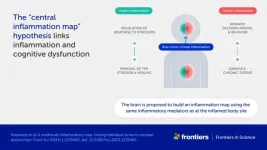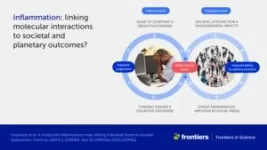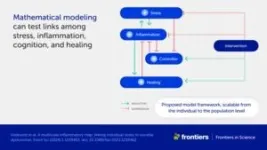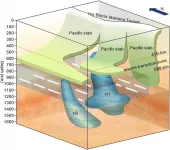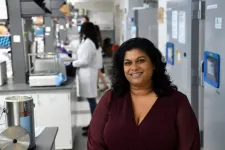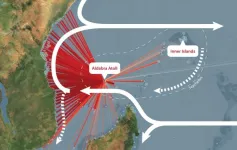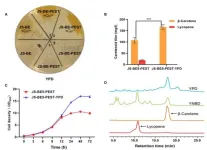(Press-News.org) From anxiety about the state of the world to ongoing waves of Covid-19, the stresses we face can seem relentless and even overwhelming. Worse, these stressors can cause chronic inflammation in our bodies. Chronic inflammation is linked to serious conditions such as cardiovascular disease and cancer – and may also affect our thinking and behavior.
A new hypothesis published in Frontiers in Science suggests the negative impacts may extend far further.
“We propose that stress, inflammation, and consequently impaired cognition in individuals can scale up to communities and populations,” explained lead author Prof Yoram Vodovotz of the University of Pittsburgh, USA.
“This could affect the decision-making and behavior of entire societies, impair our cognitive ability to address complex issues like climate change, social unrest, and infectious disease – and ultimately lead to a self-sustaining cycle of societal dysfunction and environmental degradation,” he added.
Bodily inflammation ‘mapped’ in the brain
One central premise to the hypothesis is an association between chronic inflammation and cognitive dysfunction.
“The cause of this well-known phenomenon is not currently known,” said Vodovotz. “We propose a mechanism, which we call the 'central inflammation map’.”
The authors’ novel idea is that the brain creates its own copy of bodily inflammation. Normally, this inflammation map allows the brain to manage the inflammatory response and promote healing.
When inflammation is high or chronic, however, the response goes awry and can damage healthy tissues and organs. The authors suggest the inflammation map could similarly harm the brain and impair cognition, emotion, and behavior.
Accelerated spread of stress and inflammation online
A second premise is the spread of chronic inflammation from individuals to populations.
“While inflammation is not contagious per se, it could still spread via the transmission of stress among people,” explained Vodovotz.
The authors further suggest that stress is being transmitted faster than ever before, through social media and other digital communications.
“People are constantly bombarded with high levels of distressing information, be it the news, negative online comments, or a feeling of inadequacy when viewing social media feeds,” said Vodovotz. “We hypothesize that this new dimension of human experience, from which it is difficult to escape, is driving stress, chronic inflammation, and cognitive impairment across global societies.”
Inflammation as a driver of social and planetary disruption
These ideas shift our view of inflammation as a biological process restricted to an individual. Instead, the authors see it as a multiscale process linking molecular, cellular, and physiological interactions in each of us to altered decision-making and behavior in populations – and ultimately to large-scale societal and environmental impacts.
“Stress-impaired judgment could explain the chaotic and counter-intuitive responses of large parts of the global population to stressful events such as climate change and the Covid-19 pandemic,” explained Vodovotz.
“An inability to address these and other stressors may propagate a self-fulfilling sense of pervasive danger, causing further stress, inflammation, and impaired cognition in a runaway, positive feedback loop,” he added.
The fact that current levels of global stress have not led to widespread societal disorder could indicate an equally strong stabilizing effect from “controllers” such as trust in laws, science, and multinational organizations like the United Nations.
“However, societal norms and institutions are increasingly being questioned, at times rightly so as relics of a foregone era,” said Prof Paul Verschure of Radboud University, the Netherlands, and a co-author of the article. “The challenge today is how we can ward off a new adversarial era of instability due to global stress caused by a multi-scale combination of geopolitical fragmentation, conflicts, and ecological collapse amplified by existential angst, cognitive overload, and runaway disinformation.”
Reducing social media exposure as part of the solution
The authors developed a mathematical model to test their ideas and explore ways to reduce stress and build resilience.
“Preliminary results highlight the need for interventions at multiple levels and scales,” commented co-author Prof Julia Arciero of Indiana University, USA.
“While anti-inflammatory drugs are sometimes used to treat medical conditions associated with inflammation, we do not believe these are the whole answer for individuals,” said Dr David Katz, co-author and a specialist in preventive and lifestyle medicine based in the US. “Lifestyle changes such as healthy nutrition, exercise, and reducing exposure to stressful online content could also be important.”
“The dawning new era of precision and personalized therapeutics could also offer enormous potential,” he added.
At the societal level, the authors suggest creating calm public spaces and providing education on the norms and institutions that keep our societies stable and functioning.
“While our 'inflammation map' hypothesis and corresponding mathematical model are a start, a coordinated and interdisciplinary research effort is needed to define interventions that would improve the lives of individuals and the resilience of communities to stress. We hope our article stimulates scientists around the world to take up this challenge,” Vodovotz concluded.
The article is part of the Frontiers in Science multimedia article hub ‘A multiscale map of inflammatory stress’. The hub features a video, an explainer, a version of the article written for kids, and an editorial, viewpoints, and policy outlook from other eminent experts: Prof David Almeida (Penn State University, USA), Prof Pietro Ghezzi (University of Urbino Carlo Bo, Italy), and Dr Ioannis P Androulakis (Rutgers, The State University of New Jersey, USA).
END
Chronic stress and inflammation linked to societal and environmental impacts in new study
Scientists hypothesize that as-yet unrecognized inflammatory stress is spreading among people at unprecedented rates and affecting our cognitive ability to address climate change, war, and other critical issues.
2024-03-12
ELSE PRESS RELEASES FROM THIS DATE:
Rice paddy snake diversification was driven by geological and environmental factors in Thailand, molecular data suggests
2024-03-12
LAWRENCE, KANSAS — A University of Kansas study of rice paddy snakes in Southeast Asia gives key details to their diversification and natural history, adding molecular evidence that the rise of the Khorat Plateau and subsequent environmental shifts in Thailand may have altered the course of the snakes’ evolution some 2.5 million years ago. The findings were published today in the journal Scientific Reports.
Researchers say the implications could help tell the story of diversification more broadly in the region.
“This paper concerns mud snakes ...
Mars attracts: How Earth’s interactions with the red planet drive deep-sea circulation
2024-03-12
Scientists from the Universities of Sydney and Sorbonne University have used the geological record of the deep sea to discover a connection between the orbits of Earth and Mars, past global warming patterns and the speeding up of deep ocean circulation.
They discovered a surprising 2.4-million-year cycle where deep currents wax and wane which, in turn, is linked to periods of increased solar energy and a warmer climate.
The study, published in Nature Communications, tackles the questions of how geological-timescale climate ...
The surprising effect of presence hallucinations on social perception
2024-03-12
If you had to estimate the number of people in a room, without counting them one-by-one, by nature you would overcount them. That’s because, simply put from a Darwinian perspective of how we have evolved, it’s better to overcount potentially harmful agents and predators than to underestimate them. This overcounting social behaviour is shown to be true in humans as well as animals. It’s certainly better to detect too many tigers (even if absent) during a jungle excursion than to miss a hungry one!
Now, EPFL neuroscientists show that if you experience hallucinations, especially ...
Seismological study shows ancient lower mantle flow field under Philippine sea plate
2024-03-12
Researchers from China and Japan have discovered distinct characteristics of the lower mantle flow field. They investigated seismic anisotropy in the upper part of the lower mantle beneath the Philippine Sea Plate (PSP) and found that the ancient lower mantle flow field is still preserved there.
The study was published in Nature Geoscience.
The lower mantle is an important layer of the Earth and may play an important role in the evolution and material cycling of Earth's interior. It is generally believed to be not only the final destination of subducted slabs, ...
Age-related changes in skin may contribute to melanoma metastases
2024-03-12
*EMBARGOED UNTIL TUESDAY, MARCH 12, AT 6 A.M. ET
Age-related changes that cause the skin to stiffen and become less elastic may also contribute to higher rates of metastatic skin cancer in older people, according to research by investigators from the Johns Hopkins Kimmel Cancer Center.
The study, published March 12 in Nature Aging, shows that increased stiffness in aging skin increases the release of a protein called ICAM1. Increased ICAM1 levels stimulate blood vessel growth in the tumor, helping it grow. It also makes the blood vessels “leaky,” enabling tumor cells ...
A coral superhighway in the Indian Ocean
2024-03-12
Despite being scattered across more than a million square kilometres, new research has revealed that remote coral reefs across the Seychelles are closely related. Using genetic analyses and oceanographic modelling, researchers at Oxford University demonstrated for the first time that a network of ocean currents scatter significant numbers of larvae between these distant islands, acting as a ‘coral superhighway.’ These results are published today in Scientific Reports.
Dr April Burt (Department of Biology, University of Oxford, and Seychelles Islands Foundation), lead author of the study, said: ‘This discovery is very important because a key factor ...
Scientists develop a rapid gene-editing screen to find effects of cancer mutations
2024-03-12
CAMBRIDGE, MA -- Tumors can carry mutations in hundreds of different genes, and each of those genes may be mutated in different ways — some mutations simply replace one DNA nucleotide with another, while others insert or delete larger sections of DNA.
Until now, there has been no way to quickly and easily screen each of those mutations in their natural setting to see what role they may play in the development, progression, and treatment response of a tumor. Using a variant of CRISPR genome-editing known as prime editing, MIT researchers have ...
Rainforest's next generation of trees threatened 30 years after logging
2024-03-12
Rainforest seedlings are more likely to survive in natural forests than in places where logging has happened – even if tree restoration projects have taken place, new research shows.
Scientists monitored over 5,000 seedlings for a year and a half in North Borneo.
They studied a landscape containing both natural forest and areas logged 30 years ago – some of which were recovering naturally, while some had been restored by methods including tree planting.
A drought had triggered “mast fruiting” across ...
Expertly engineered saccharomyces cerevisiae yeast strain in the optimized production of carotenoids
2024-03-12
More than 90% of the commercially available carotenoids are synthetically produced using chemicals. To meet the increasing demand for cost-effective natural compounds in carotenoid synthesis, researchers at Xiamen University, China, have developed an engineered S. cerevisiae yeast strain capable of selectively overproducing carotenoids. They redesigned the genomic sequence and critical pathways to optimize carotenoid production. This novel and successful research approach can be extended to other model ...
Beer byproduct behind Marmite could help us recycle metal waste
2024-03-12
When we recycle electronic devices we can no longer use, we expect to make the most out of the precious natural resources that went into building them. But electronic waste is notoriously difficult to recycle, because it’s hard to separate the different metals in the waste from each other. Scientists have now found a way of selectively capturing metals from a waste stream using spent brewer’s yeast, the same beer byproduct that goes into Marmite. Not only that: the yeast can be reused, making the process even more eco-friendly.
“Electronic waste is difficult to recycle because it is very heterogeneous,” said Dr Klemens Kremser ...
LAST 30 PRESS RELEASES:
The world’s largest brain research prize awarded for groundbreaking discoveries on how we sense touch and pain
Magnetofluids help to overcome challenges in left atrial appendage occlusion
Brain-clearing cells offer clues to slowing Alzheimer’s disease progression
mRNA therapy restores fertility in genetically infertile mice
Cloaked stem cells evade immune rejection in mice, pointing to a potential universal donor cell line
Growth in telemedicine has not improved mental health care access in rural areas, study finds
Pitt scientists engineer “living eye drop” to support corneal healing
Outcomes of older adults with advanced cancer who prefer quality of life vs prolonging survival
Lower music volume levels in fitness class and perceived exercise intensity
Of crocodiles, counting and conferences
AERA announces 2026 award winners in education research
Saving two lives with one fruit drop
Photonic chips advance real-time learning in spiking neural systems
Share of migratory wild animal species with declining populations despite UN treaty protections worsens from 44% to 49% in two years; 24% face extinction, up 2%
One in 20 babies experiences physical abuse, global review finds
Tundra tongue: The science behind a very cold mistake
Targeting a dangerous gut infection
Scientists successfully harvest chickpeas from “moon dirt”
Teen aggression a warning sign for faster aging later in life
Study confirms food fortification is highly cost-effective in fighting hidden hunger across 63 countries
Special issue elevates disease ecology in marine management
A kaleidoscope of cosmic collisions: the new catalogue of gravitational signals from LIGO, Virgo and KAGRA
New catalog more than doubles the number of gravitational-wave detections made by LIGO, Virgo, and KAGRA observatories
Antifibrotic drug shows promise for premature ovarian insufficiency
Altered copper metabolism is a crucial factor in inflammatory bone diseases
Real-time imaging of microplastics in the body improves understanding of health risks
Reconstructing the world’s ant diversity in 3D
UMD entomologist helps bring the world’s ant diversity to life in 3D imagery
ESA’s Mars orbiters watch solar superstorm hit the Red Planet
The secret lives of catalysts: How microscopic networks power reactions
[Press-News.org] Chronic stress and inflammation linked to societal and environmental impacts in new studyScientists hypothesize that as-yet unrecognized inflammatory stress is spreading among people at unprecedented rates and affecting our cognitive ability to address climate change, war, and other critical issues.
